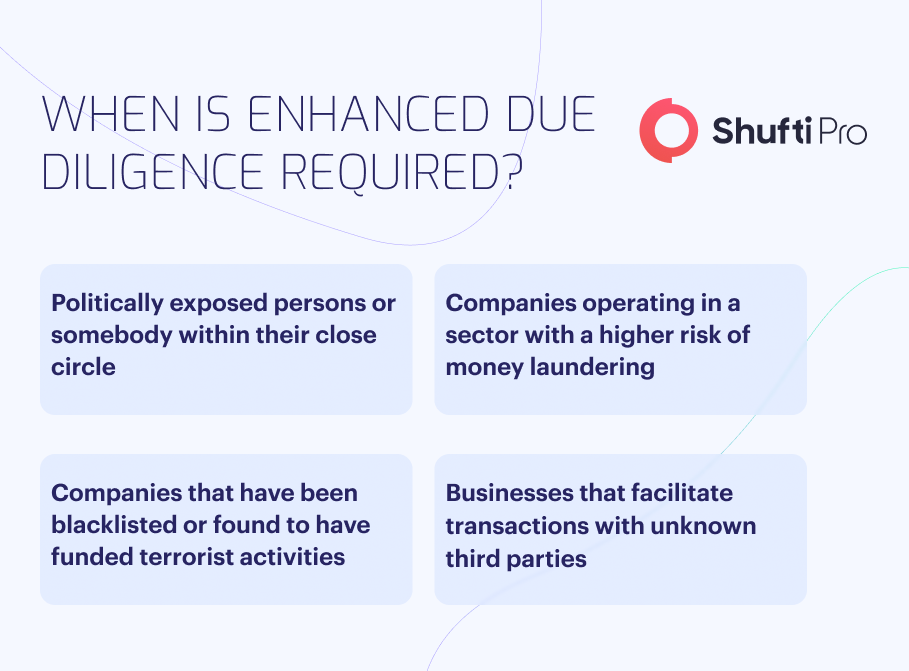EDD in Banking: Going Beyond CDD to Establish Trust in the Digital Age

With technological advancement, hackers are also becoming smarter to bypass verification processes and use companies’ sensitive data for illicit purposes. Roughly $2tn cash flows illegally through the international financial system every year. There are no signs of financial crime slowing down despite financial institutions trying to sustain stability through revised legislation, enforcement actions, and enhanced collaboration. Thus, businesses should consider performing risk assessments to protect themselves from high-risk customers.
A Quick Overview of EDD in Banking
Enhanced Due Diligence (EDD) is the crucial step of Know Your Customer (KYC) compliance. EDD collects the details of customers and calculates the risk level they can pose to any bank or financial firm.
To conduct EDD in banks, the Financial Action Task Force (FATF) suggests a risk-based strategy whereby “the amount and type of information obtained, and the extent to which this information is verified, must be increased where the risk associated with the business relationship is higher.”
FATF suggests key steps to conduct enhanced due diligence for banks:
- Acquiring additional identity details from a wide variety of hardy and independent sources
- Performing adverse media searches
- Commissioning a report on the client or Ultimate Beneficial Owners (UBOs) to check if they could be involved in illegal activity thoroughly
- Authenticating the origin of funds or capital involved in business relationships
- Getting additional details from the client regarding the objective and intended nature of the business relationship
Not only this but FATF then urges banks to implement a risk-based strategy that can monitor any customer in real-time and alert them whenever any suspicious activity takes place.
CDD and EDD – What’s the Difference?
Customer Due Diligence (CDD) and EDD are two different tires of the same KYC process. CDD involves authenticating clients by comparing the provided information with the databases, while EDD goes beyond this.
Reserved for those clients that are categorised as a high risk like Politically Exposed Persons (PEPs) or those who appear on any of the sanction lists, EDD adds extra steps to the due diligence procedure. Furthermore, in EDD compliance officers asks the client for more details to get their verification done. EDD in KYC is a more rigorous and time-consuming approach for the bank and the clients than CDD.

AML Violations and the Need for EDD
Regulators are busy implementing stringent laws to protect firms from fraudulent activities and businesses are busy generating profits. They still need to comply with KYC/AML regulations and are becoming the subject of hefty fines. This makes EDD a must-have for firms to avoid financial penalties and high-risk situations.
Here’s a quick look at the latest AML fines that makes EDD a need of the hour:
Gambling Commission Imposed £6.1 Million Fine on Touch Games for Money Laundering Failings
The Touch Games has been charged £6.1 million over failure to own their social responsibility and violating Anti Money Laundering (AML) rules.
Responsibility failures mean the business lacks social interaction with its customers. It was reported that the firm hadn’t interacted with its customers for seven weeks after they were flagged for extended play. Furthermore, the customers earned £6,000 without any authentication and were flagged for gambling during unsociable hours.
The Executive Director of Operations at the Gambling Commission, Kay Roberts said: “Considering this operator’s history of failings we expected to see significant improvement when we carried out our planned compliance assessment. Disappointingly, although many improvements had been made, there was still more to do.”
FINTRAC Issues Alert on Money Laundering From Illegal Wildlife Trade
FINTRAC has issued an alert on money laundering activities from illegal wildlife trade.
Wildlife trade is a major transnational offence that produces billions of criminal proceedings yearly. As per the Wildlife Justice Commission news, “illegal wildlife trading is a low-risk and high-reward criminal activity that often involves fraud schemes and tax evasion”.
FINTRAC has issued a new alert which helps businesses subject to Money Laundering (ML) and Terrorism Financing (TF) to pinpoint and report transactions related to illegal wildlife trade.
The reporting will support law enforcement agencies in probing into this terrible and vicious crime in Canada and abroad.
UAE Central Bank Fines Firm $490,000 for Violating AML/CFT Laws
The central bank of the United Aarab Emirates (UAE) has charged a financial firm $490,000 for violating Anti Money Laundering and Countering Terrorism Financing (AML/CTF) regulations.
The sanctions followed a comprehensive review by a third-party consultant. The investigations carried out by the banking regulator showed high risk and repeated AML/CTF breaches from the firm and operational failings from the board of directors.
The bank didn’t disclose the name of the concerned company. As per the regulator, “The findings illustrate that the finance company engaged in high-risk, repeated violations and had an overall weak compliance culture relating to policies and procedures designed for AML/CFT.”
Where Shufti Steps in
Remove the risk of money laundering with Shufti’s AML solution, screening against 1700+ global watchlists and verifying customers in less than a second. Moreover, Shufti’s AML solution conducts background checks of UBOs in real-time, eliminates risks of non-compliance penalties, and keeps firms ahead of criminals.
Discover how your business can prevent money laundering and other financial crimes.

 Explore Now
Explore Now













